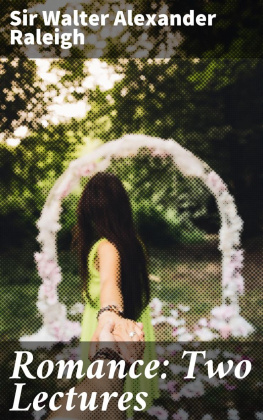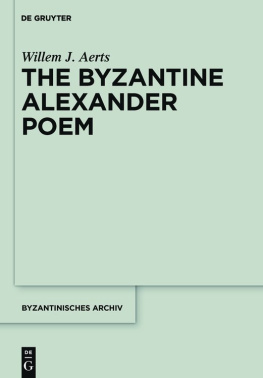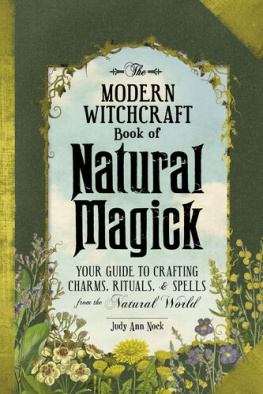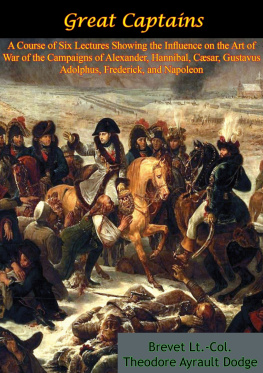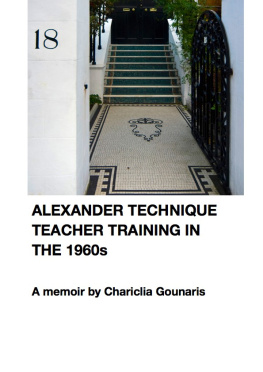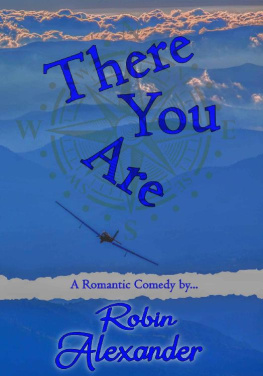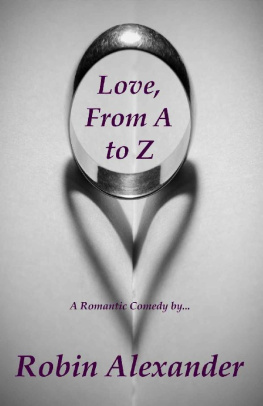ROMANCE
Table of Contents
two lectures by
SIR WALTER RALEIGH
m.a. , professor of english literature in the
university of oxford, fellow of
merton college
lectures delivered at princeton
university , may 4th and 6th , 1915
PRINCETON UNIVERSITY PRESS
PRINCETON
LONDON: HUMPHREY MILFORD
OXFORD UNIVERSITY PRESS
1916
Copyright, 1916, by
Princeton University Press
Published October, 1916
THE ORIGIN OF ROMANCE
Table of Contents
The period of English political history which falls between Pitts acceptance of office as prime minister, in 1783, and the passing of the Reform Bill, in 1832, is a period rich in character and event. The same period of fifty years is one of the most crowded epochs of our national literature. In 1783 William Blake produced his Poetical Sketches, and George Crabbe published The Village. In 1832 Scott died, not many months after the death of Goethe. Between these two dates a great company of English writers produced a literature of immense bulk, and of almost endless diversity of character. Yet one dominant strain in that literature has commonly been allowed to give a name to the whole period, and it is often called the Age of the Romantic Revival.
We do not name other notable periods of our literature in this fashion. The name itself contains a theory, and so marks the rise of a new philosophical and aesthetic criticism. It attempts to describe as well as to name, and attaches significance not to kings, or great authors, but to the kind of writing which flourished conspicuously in that age. A less ambitious and much more secure name would have been the Age of George III; but this name has seldom been used, perhaps because the writers of his time who reverenced King George III were not very many in number. The danger of basing a name on a theory of literature is that the theory may very easily be superseded, or may prove to be inadequate, and then the name, having become immutable by the force of custom, is left standing, a monument of ancient error. The terminology of the sciences, which pretends to be exact and colourless, is always being reduced to emptiness by the progress of knowledge. The thing that struck the first observer is proved to be less important than he thought it. Scientific names, for all their air of learned universality, are merely fossilized impressions, stereotyped portraits of a single aspect. The decorous obscurity of the ancient languages is used to conceal an immense diversity of principle. Mammal, amphibian, coleoptera, dicotyledon, cryptogamall these terms, which, if they were translated into the language of a peasant, would be seen to record very simple observations, yet do lend a kind of formal majesty to ignorance.
So it is with the vocabulary of literary criticism: the first use of a name, because the name was coined by someone who felt the need of it, is often striking and instructive; the impression is fresh and new. Then the freshness wears off it, and the name becomes an outworn print, a label that serves only to recall the memory of past travel. What was created for the needs of thought becomes a thrifty device, useful only to save thinking. The best way to restore the habit of thinking is to do away with the names. The word Romantic loses almost all its meaning and value when it is used to characterize whole periods of our literature. Landor and Crabbe belong to a Romantic era of poetry; Steele and Sterne wrote prose in an age which set before itself the Classic ideal. Yet there is hardly any distinctively Classical beauty in English verse which cannot be exemplified from the poetry of Landor and Crabbe; and there are not very many characteristics of Romantic prose which find no illustration in the writings of Steele and Sterne. Nevertheless, the very name of romance has wielded such a power in human affairs, and has so habitually impressed the human imagination, that time is not misspent in exhibiting its historical bearings. These great vague words, invented to facilitate reference to whole centuries of human historyMiddle Ages, Renaissance, Protestant Reformation, Revival of Romanceare very often invoked as if they were something ultimate, as if the names themselves were a sufficient explanation of all that they include. So an imperfect terminology is used to gain esteem for an artificial and rigid conception of things which were as fluid as life itself. The Renaissance, for instance, in its strict original meaning, is the name for that renewed study of the classical literatures which manifested itself throughout the chief countries of Europe in the fifteenth and sixteenth centuries. In Italy, where the movement had its origin, no single conspicuous event can be used to date it. The traditions inherited from Greece and Rome had never lost their authority; but with the increase of wealth and leisure in the city republics they were renewed and strengthened. From being remnants and memories they became live models; Latin poetry was revived, and Italian poetry was disciplined by the ancient masters. But the Renaissance, when it reached the shores of England, so far from giving new life to the literature it found there, at first degraded it. It killed the splendid prose school of Malory and Berners, and prose did not run clear again for a century. It bewildered and confused the minds of poets, and blending itself with the national tradition, produced the rich lawlessness of the English sixteenth century. It was a strong tributary to the stream of our national literature; but the popular usage, which assigns all that is good in the English literature of the sixteenth and seventeenth centuries to a mysterious event called the Renaissance, is merely absurd. Modern scholars, if they are forced to find a beginning for modern literature, would prefer to date it from the wonderful outburst of vernacular poetry in the latter part of the twelfth century, and, if they must name a birthplace, would claim attention for the Court of King Henry II.
In some of its aspects, the Romantic revival may be exhibited as a natural consequence of the Renaissance. Classical scholarship at first scorned the vernacular literatures, and did all its work of criticism and imitation in the Latin tongue. By degrees the lesson was widened, and applied to the modern languages. Study; imitation in Latin; extension of classical usages and principles to modern literaturethese were the regular stages in the progress of the classical influence. When the poets of France and England, to name no others, had learned as much as they were able and willing to learn from the masters of Greece and Rome, the work of the Renaissance was done. By the middle of the eighteenth century there was no notable kind of Greek or Latin literaturehistorical, philosophical, poetical; epic, elegy, ode, satirewhich had not worthy disciples and rivals in the literatures of France and England. Nothing remained to do but to go further afield and seek for new masters. These might easily have been found among the poets and prophets of the East, and not a few notable writers of the time began to forage in that direction. But the East was too remote and strange, and its languages were too little known, for this attempt to be carried far; the imitation of Chinese and Persian models was practised chiefly by way of fantasy and joke. The study of the neglected and forgotten matter of mediaeval times, on the other hand, was undertaken by serious scholars. The progress of the mediaeval influence reproduced very exactly the successive phases of the Classical Renaissance. At first there was study; and books like Sainte Palayes


